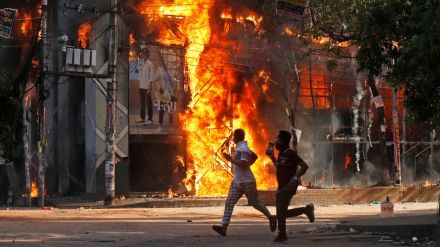Since the resignation of Prime Minister Sheikh Hasina on August 5, Bangladesh has witnessed a surge in violence targeting minority communities, with at least 205 incidents reported across 52 districts, according to two major Hindu organisations.
The Bangladesh Hindu Buddhist Christian Unity Council and the Bangladesh Puja Udjapan Parishad released these figures in an open letter to Nobel laureate Muhammad Yunus, who has recently been sworn in as the head of an interim government.
The data reveals a troubling pattern of attacks since Hasina’s departure, which followed widespread protests against her government over a controversial job quota system. The protests, which had been escalating for weeks, culminated in Hasina’s resignation and subsequent flight to India. The interim government, led by Yunus, faces urgent calls to address the escalating violence.
Nirmal Rosario, a president of the unity council, described the dire situation faced by minority communities. “We seek protection because our lives are in a disastrous state. We are staying up at night, guarding our homes and temples. I have never seen anything like this in my life. We demand that the government restore communal harmony in the country,” Nirmal Rosario said.
The open letter, also signed by Rana Dasgupta, General Secretary of the Bangladesh Hindu Buddhist Christian Unity Council, and Basudev Dhar, President of the Bangladesh Puja Udjapan Parishad, called on Yunus to prioritize ending the violence.
The letter condemned the attacks as a deliberate attempt to undermine the achievements of the recent student and public-led uprisings aimed at reforming the country.
International outcry over violence against minorities
The ongoing violence has generated widespread fear and uncertainty among minorities in Bangladesh and has drawn international condemnation. Kajal Devnath, a praesidium member of the unity council, demanded justice for those targeted, stating, “Those involved in attacking minorities must be brought to justice. If a minority individual is attacked for political reasons, it is still unacceptable. Anyone who commits a crime should be judged, but burning homes and looting will not lead to justice.”
In response to the crisis, Yunus has announced the formation of a 16-member advisory council, with stabilising the country being a primary objective. Yunus, who assumed the position of Chief Advisor—a role akin to a prime minister—was called upon by student protesters to lead the interim government following weeks of anti-government demonstrations.
Interim government focuses on law and order
Foreign Affairs Adviser Hossain emphasised that restoring law and order is the interim government’s top priority. Once we stabilize the situation, we will address other issues, Hossain said.
The United Nations has also weighed in on the situation. Farhan Haq, Deputy Spokesperson for UN Secretary-General Antonio Guterres, condemned the racially motivated attacks.
“What we’ve made clear is we want to make sure that the violence that has been occurring in Bangladesh in recent weeks is tamped down. Certainly, we stand against any racially based attacks or racially based incitement to violence,” Haq said.
Over 230 killed in violence post Hasina’s fall
The recent violence has claimed over 230 lives, pushing the total death toll to 560 since the protests against the quota system began in mid-July. Reports indicate that Hindu temples, homes, and businesses have been vandalized, women assaulted, and at least two Hindu leaders affiliated with Hasina’s Awami League party have been killed.
As Bangladesh navigates this period of instability, the interim government faces mounting p ressure to restore peace and address the pressing concerns of minority communities affected by the recent surge in violence.
(With inputs from PTI)
